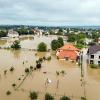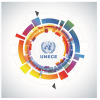News
Displaying Results 351 - 375 of 414
Black carbon (BC) is an air pollutant with significant impacts on our health and climate. Resulting from incomplete combustion processes, it is part of fine particulate pollution (PM2.5) and estimated to have a warming impact on climate that is 460–1,500 times greater than that of carbon dioxide (…
Mobility is a primary enabler of our economic and social life. However, despite its many benefits, the costs of mobility to societies around the world remain unacceptably high. These include greenhouse gas emissions (transport accounts for some 24% of global CO2 emissions, three quarters of which…
In 2021, the volume of world merchandise trade is expected to increase by 8 per cent after falling 5.3 per cent in 2020. How UN/CEFACT recommendations and e-business standards can help boost trade and e-commerce was one of the key topics of the 36th UN/CEFACT Forum, convened online, by UNECE over…
Between 1999 and 2018, nearly 6,000 different species of illegally-traded fauna and flora were seized worldwide. The Convention on International Trade in Endangered Species of Wild Fauna and Flora (CITES) aims at ensuring sustainable livelihoods and protecting ecosystem. CITES provides protection…
Decarbonizing transport and mobility remains a critical policy challenge, for which we must seize the recovery from the COVID-19 pandemic as a unique opportunity to accelerate progress. Decarbonization is one example of an issue where transport, health, and environment all meet – an intersection…
Water, health, climate change and disaster risk reduction are interlinked and interdependent. For example, with climate change, floods and droughts increase in both intensity and frequency. Floods can damage water and sanitation infrastructure, disrupt essential public service provision, undermine…
When scientists in the 1960s investigated the causes of the die-back of forests, the so-called ‘Waldsterben’, and acidification of lakes with associated fish loss, they found that air pollution, often emitted thousands of kilometres away, was the culprit. This research formed the basis for the…
Progress in reducing emissions of key air pollutants has been uneven across the UNECE region over the past few decades. To create a level playing field across the region, the Protocol to Abate Acidification, Eutrophication and Ground-level Ozone (Gothenburg Protocol), a unique instrument to reduce…
Air Convention Task Force discusses impacts of COVID-19 lockdowns on air quality in the UNECE region
One year after the first COVID-19 lockdown in many parts of the UNECE region, scientists and experts are studying the effects of lockdown measures on air quality. A study from Germany showed that while levels of nitrogen oxides (NO2) measured at urban stations decreased during the lockdown in…
International collaboration facilitated by UNECE is helping statistical organizations around the world move towards producing essential statistics in innovative ways based on machine learning (ML) and artificial intelligence (AI).
The Machine Learning 2021 Group, led by the United Kingdom’s Data…
The extraction of raw materials worldwide has more than doubled since 1990 and could double again by 2060 in the absence of corrective policies. According to the UN International Resources Panel, resource extraction and processing account for 90% of global biodiversity loss and water stress impacts…
The 2030 Agenda with its 17 Sustainable Development Goals provides an ambitious and comprehensive framework that opens new perspectives for policymaking and international cooperation. While progress in its implementation is being made in the UNECE region, our recent statistical report showed that…
UNECE continues to help its member States to respond to COVID-19 crisis. As part of this work, Guidelines and Best Practices for Micro-, Small and Medium Enterprises in Delivering Energy-Efficient Products and in Providing Renewable Energy Equipment developed earlier are being customized for North…
Buildings consume over 70 per cent of the electrical power generated and 40 per cent of primary energy and are responsible for 40 per cent of carbon dioxide emissions from related fuel combustion. At the same time, in 2018, out of 4.5 trillion USD spent on building construction and renovation, the…
A small sub-set of small- and medium-sized enterprises – innovative, high-growth enterprises (IHGEs) – play an outsize role in innovation and structural transformation across the world. They spearhead experimentation with new ideas to create value, address challenges, and reduce transaction costs…
The Government of Ukraine is currently implementing a broad policy agenda aimed at achieving the Sustainable Development Goals (SDGs) and pursuing a resilient, inclusive and sustainable post-COVID recovery. UNECE, together with UNDP, UNICEF and WHO, is supporting these efforts through a Joint…
The countries of Eastern Europe and the South Caucasus (the EESC sub-region), Armenia, Azerbaijan, Belarus, Georgia, the Republic of Moldova and Ukraine have come a long way in their transition from centrally planned towards market-based economies. After a difficult first decade following…
To reduce transmission of the novel coronavirus, Governments in the UNECE region introduced social distancing and other measures, which have often included restrictions on the freedoms of assembly and of movement. Consequently, there has been an impact on procedural rights of public participation…
While consumer demand for sustainable goods is an important driver for change, regulation and policy change are essential if the world is to side-step a climate catastrophe and bend traditional linear economic models towards a circular economy and sustainable future. Until recently it wasn’t clear…
The 56 countries of the UNECE region, spanning from North America to Europe, the Balkans, the Caucasus and Central Asia, are major users and producers of natural resources. Efficiency in the domestic use of resources continues to increase in the region, but the overall material footprint, which…
The COVID-19 pandemic has hit the economy hard. Global GDP is estimated to have fallen by 3.5 in 2020, and even more steeply in parts of the UNECE region. International trade has been disrupted. Progress towards the UN Sustainable Development Goals has slowed down at a time when it would be…
Hydrogen is not a mere dangerous good. It is perhaps our best chance to attain carbon neutrality by 2050, was the conclusion of a brainstorming on carbon neutrality held at UNECE this week. More than 200 experts attended the online discussion that explored production, transport, storage and use of…
Snowy trees, long winters, freezing temperatures – this is the common perception one has of the boreal forest. Yet the boreal forest, which circles the northern hemisphere and forms a ring around the north pole, is the world’s largest and perhaps most overlooked land biome. It covers 27 per cent of…
#1 Explore the issues that are on everyone’s mind
One year into the COVID-19 pandemic, the Regional Forum (10-18 March 2021) offers a space to reflect on how the Sustainable Development Goals (SDGs) can guide us to recover better. The spectrum of topics covered at the virtual multi-stakeholder…
A new working paper, Measuring Migration and Remittances in UNECE Countries during the Pandemic, reveals both innovative solutions and continued hurdles as countries strive to gather information about international migration under pandemic conditions.
The onset of the Covid-19 pandemic brought…


























